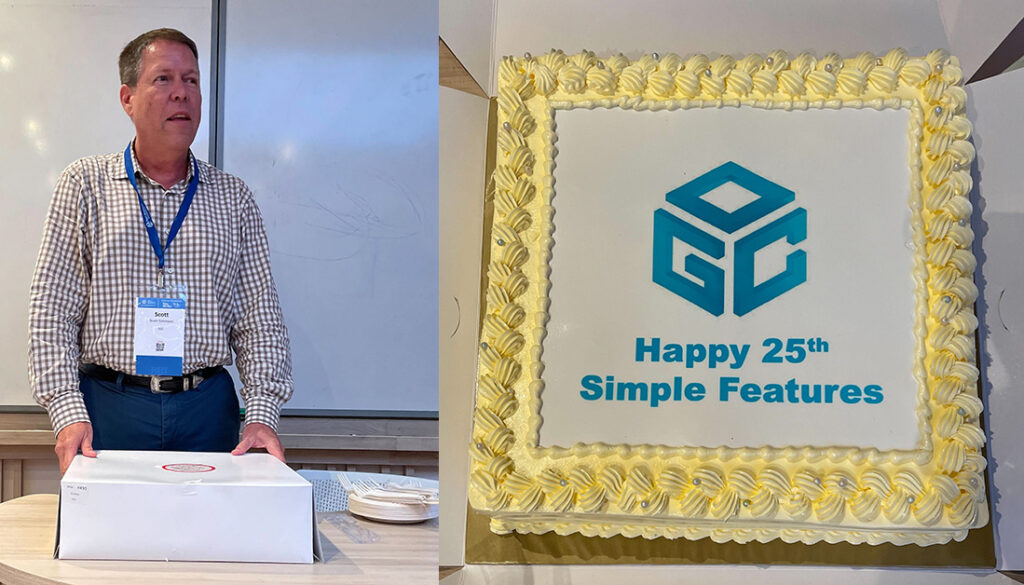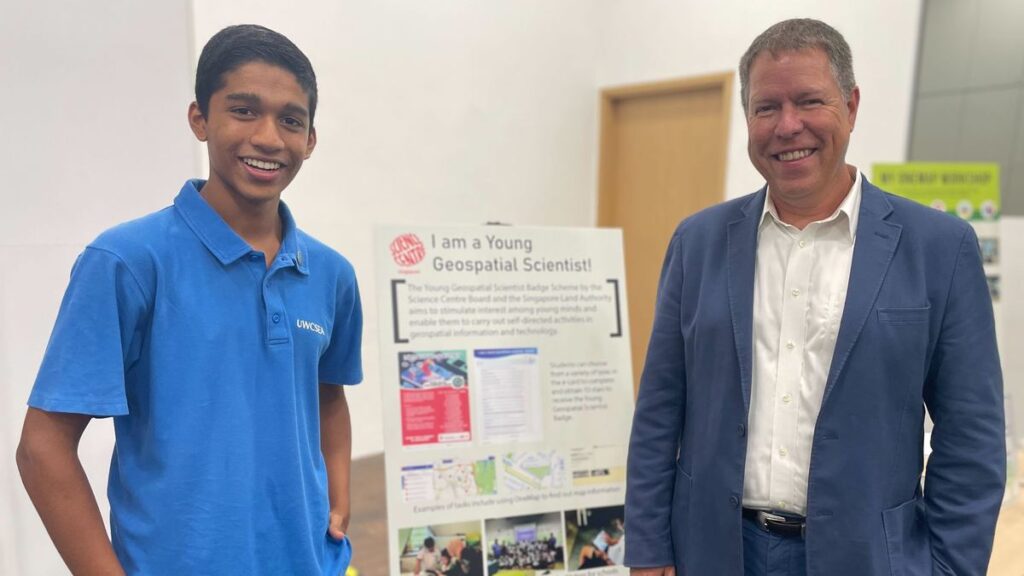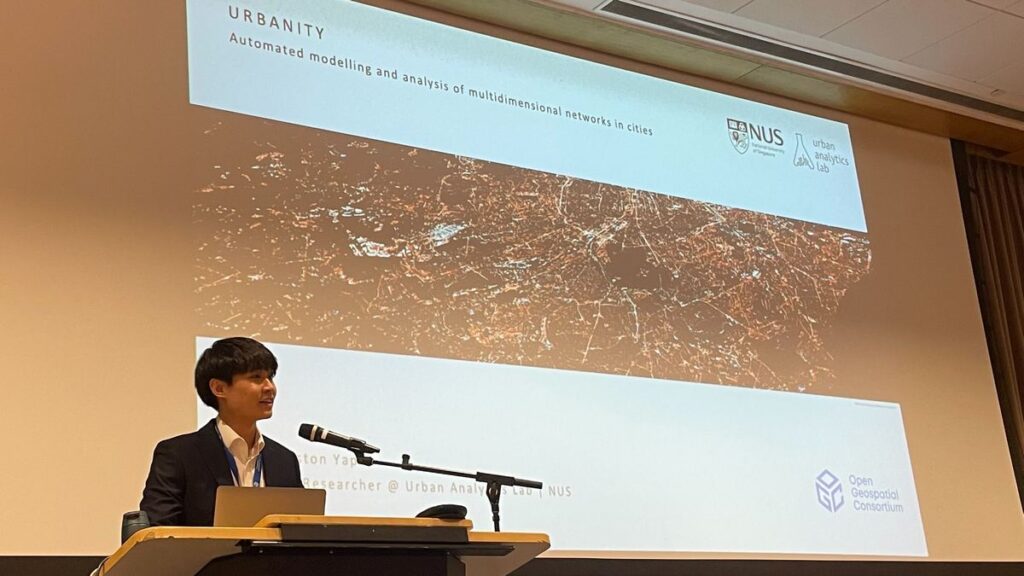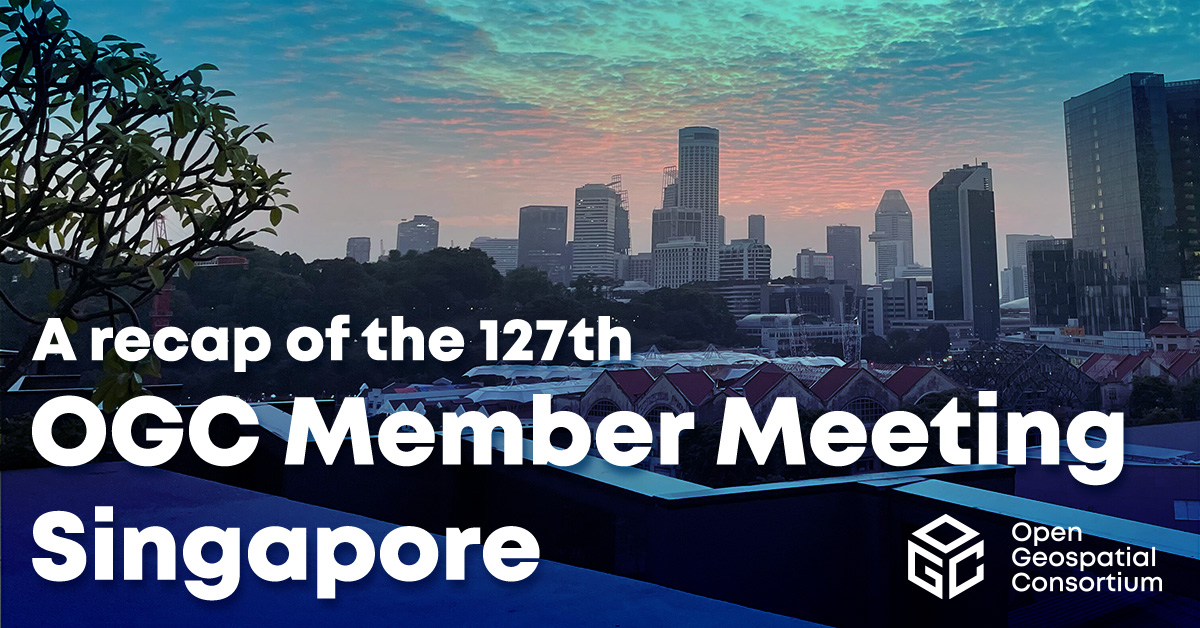From September 25-29, 2023, more than 100 geospatial experts from around the world converged in Singapore to attend OGC’s 127th Member Meeting, with another 100+ attending online. As always, big thanks go out to our dedicated members that either attended in-person, or juggled lives across multiple timezones to attend virtually.
Sponsored by OGC Principal Member, the Singapore Land Authority (SLA), the meeting was themed “Building future standards for the next generation of geospatial experts.” Once again, the Member Meeting was held in conjunction with the Singapore Geospatial Festival 2023 operated by SLA’s GeoWorks.
Alongside the usual assortment of Standards Working Group (SWG) and Domain Working Group (DWG) meetings, the Member Meeting also saw several special sessions, including: a two-part Data Quality Workshop; a session on Modeling of Humanities’ Spatio-Temporal Data; a Digital Twins special session; a session on the OGC Academy; a Connecting Land and Sea special session; an Intelligent Transportation Systems (ITS) ad hoc; and a meeting of the OGC Asia Forum.
Monday evening’s welcome reception celebrated Simple Features’ 25th birthday with a suitably delicious cake and an enthusiastic rendition of “Happy Birthday.” Simple Features, which is jointly published with ISO, is OGC’s earliest standard and describes how to model the location of “features” (a geometric representation of anything of interest) on a 2-dimensional space representing the surface of a planet. And of course there was the usual Wednesday night “VIP Dinner” (held at the delicious Red House Seafood), where Wuhan University received an OGC Community Impact Award, and a luncheon held on Thursday.

Themes from the week
As is befitting of the location in Singapore, with its advanced modeling of the whole nation, across the entirety of the Member Meeting were presentations related to Digital Twins – twins not only of the built environment, but for vegetation, the ocean, and the subsurface. Several Working Groups regularly include discussion on Digital Twins related to their scope, especially the Urban Digital Twins DWG. Related topics regarding the Metaverse and Interoperable Simulation and Gaming also continue regular appearances at OGC meetings.
Marine and coastlines play an important role in economies and climate resilience strategies alike. OGC has a long-running pilot project on marine geospatial infrastructure, and we continue to refine models for describing and managing the coastal land-sea interface. We expect this work to be extended to the topics of ITS and logistics in the coming years, too.
A Kick-off and a Joint Opening
The OGC Member Meeting started on Monday, but as it was held jointly with the Singapore Geospatial Festival, the joint opening wasn’t until Tuesday. Monday, then, kicked off with a brief welcome session before the ever-popular Today’s Innovations, Tomorrow’s Technologies and Future Directions session.
The topic of this meeting’s Future Directions session was Geospatial Artificial Intelligence. Dr. Gobe Hobona, OGC’s Director of Product Management, opened with an overview of where this topic fits in the context of previous sessions. He was then followed by three presentations:
- Kyoung-Sook Kim from the National Institute of Advanced Industrial Science & Technology (AIST) presented a Design Standardization Roadmap for GeoAI.
- Peter Baumann, Dimitar Misev, and Otoniel Campos of Constructor University (formerly Jacobs University) presented on Scalable Datacube-Enabled AI Infrastructure Based on Open Standards.
- Amey Godse and Sunil Shah of Duality Robotics presented on Building Digital Site Twins Using Geospatial Data and Artificial Intelligence.
The speakers then participated in a panel fielding audience questions, including their views on the fundamental scope of the AI domain in a geospatial context, and what types of machine learning need OGC’s attention and which may be less relevant. OGC Members can access the presentations and a recording on this page in the OGC Portal.
The joint Opening session on Tuesday featured keynote remarks from Colin Low, Chief Executive, SLA, and myself. The Guest of Honor was Dr. Mohamad Maliki Bin Osman, Minister in the Prime Minister’s Office, Second Minister for Education & Foreign Affairs. The session also featured presentations from local students who had performed impressive geospatial projects in their primary schools. It finished with a panel on “Geospatial: Enriching Minds, Empowering Lives,” which was also the key theme for the Singapore Geospatial Festival.

Meeting Special Sessions
The week continued with its usual array of SWG and DWG meetings, interspersed with several special sessions, outlined below.
The OGC Data Quality DWG held two sessions to comprise a workshop covering a breadth of data quality topics. The first session focused on the work of ISO/TC 211 on data quality measures and a registry to be hosted by OGC. The second session included presentations on the data quality requirements and considerations for a variety of types of geospatial data, including 3D and imagery. OGC Members can access the presentations and a recording on this page in the OGC Portal.
The session on Modeling of Humanities’ Spatio-Temporal Data was organized by participants in the HumSpatial Consortium, in which OGC participates, to address the complexities of representing “named places” in geospatial technologies. Presentations were given by scholars and practitioners from the humanities research and government sectors heavily involved with place-names and other types of geospatial data. OGC Members can access the presentations and a recording on this page in the OGC Portal.
Several sessions over the course of the week included presentations related to Digital Twins, often in the context of other domains, such as Artificial Intelligence or Data Quality. A dedicated special session for Digital Twins was organized to demonstrate different information types and practices and facilitate discussion on the relative meaning/relationship between digital twins, the metaverse, and the industrial metaverse. OGC Members can access the presentations and a recording on this page in the OGC Portal.
The OGC Academy is an information portal for distributing OGC knowledge related to the work of the Consortium and general geospatial interoperability. The web-based resources are under development with an estimated completion in 2026. Content is continuously refreshed. This session discussed capacity building and the academy more broadly. OGC Members can access the presentations and a recording on this page in the OGC Portal.
The OGC Marine DWG organized a follow-up session to the one hosted last year in Singapore on “Connecting Land and Sea” to highlight activities in the OGC Federated Marine Spatial Data Infrastructure Pilot as well as work from OGC members around the world. OGC Members can access the presentations and a recording on this page in the OGC Portal.
The Intelligent Transportation Systems (ITS) ad hoc session highlighted work in ISO/TC 204, with whom OGC maintains a liaison, and explored the next steps for related work in OGC. Attendees generally accepted that ITS work intersected several OGC Working Groups and that a new effort to refine the road network model developed in TC 204 would be suitable for OGC activities. OGC Members can access the presentations and a recording on this page in the OGC Portal.
At each OGC Member Meeting, one or more local forums meet to present and discuss topics of regional interest. On Friday of the Member Meeting, the OGC Asia forum offered a short history on the forum and five presentations from across the region. OGC Members can access the presentations and a recording on this page in the OGC Portal.

Closing and Important Things
The Member Meeting’s Closing session began with the Important Things session and my rapid, 15-minute summary of the entire meeting week that included slides and content from a large number of Working Group sessions. OGC Members can access the presentation and a recording on this page in the OGC Portal.
The Important Things session then proceeded with two discussion topics:
- “Is the ‘fundamental model’ of geospatial 2D, 3D, 4D, or more D?” with consideration to whether the minimum number of dimensions is necessary, or whether all dimensions should just be assumed.
- “The need to establish a policy for the governance of building blocks” where the TC concluded that more discrete definitions are needed for “building blocks” and other registered items that act as useful components in geospatial architecture.
Notes from the session were recorded in the Etherpad “Important-Things-2023-09”, which is available to OGC Members via the Portal.
The formal Closing Plenary then followed, which focuses on Working Group presentations and voting. The session advanced a number of Standards, SWGs, and documents toward vote or publication, so keep your eye on our news page, or subscribe to the “Standards updates” topic on the OGC Mailing List to get notifications sent straight to your inbox.
Thank you
Our 127th Member Meeting was yet another memorable meeting. It’s so great to see OGC Members discuss, collaborate, and drive technology and standards development forward in support of some of the biggest issues facing humanity. Once again, a sincere thank you to our members for investing their time and energy, as well as their dedication to making OGC the world’s leading and most comprehensive community of location experts.
Be sure to join us at TU Delft, Netherlands, on March 25-29, 2024, for our 128th Member Meeting. Registration and further info will be available soon on ogcmeet.org. Sponsorship opportunities are also available – contact us for more info.
In the meantime, don’t miss our 2023 Innovation Days event, December 5-7 in Washington, DC, USA. The multi-day event brings together policy makers, program decision-makers, and other experts in geospatial to showcase climate, emergency, and disaster management & resilience solutions that scale from local to global impacts.

